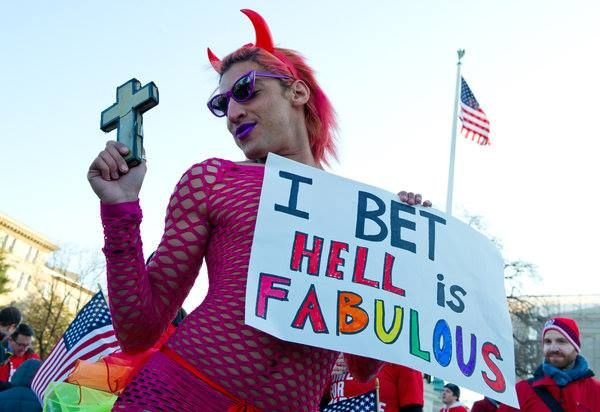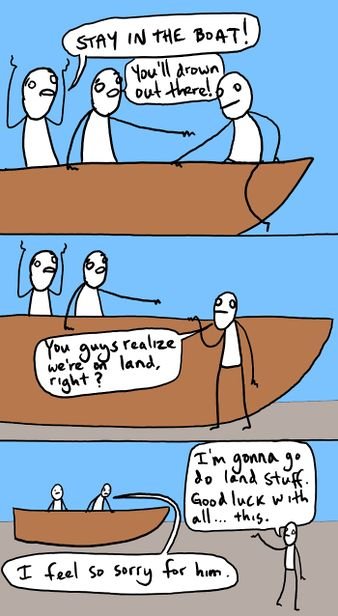
Over the past sixteen years, I have received countless emails and social media messages from Independent Fundamentalist Baptist (IFB) pastors, evangelists, missionaries, and everyday church members. These emails and messages are typically hateful, judgmental, mean-spirited, and unkind. Some IFB adherents have threatened me with physical harm, including murder. They have also threatened my partner, our daughter with Down syndrome, and our other children. With no decency, no respect, and no regard for how their words might be perceived, these so-called lovers of Jesus ignore their Savior’s commands about how to treat their enemies. The Sermon on the Mount is nowhere to be found in their Bibles.
This behavior is not new, nor is it atypical. Abused people tend to abuse others. When you spend your life being berated and judged — hard, foot-stomping, pulpit-pounding, hellfire and brimstone preaching, brother! — by their pastors, is it any wonder that when they get older, they repeat the same behavior? The late Jack Hyles turned out thousands of preachers just like him, men filled with certainty and arrogance who Sunday after Sunday abuse their congregants with the pure words of God straight from the King James Bible. The late Cecil Hodges, a notable IFB preacher, said one time at a conference I was attending, “We hit our people over the head with the sin stick so often that they duck when we begin to preach.” Boy, ain’t that the truth. When you are psychologically abused and assaulted this way year after year, you begin to think the abuse is “normal.”
Some IFB preachers are nice people with winsome, kind, helpful personalities. By all accounts, they are respected by people both inside and outside of the church. Recently, Republican Mike Johnson was chosen to be the speaker of the House. Johnson is an all-round nice guy. However, when you look at his Fundamentalist Baptist beliefs and practices, you find a very different kind of man — beliefs that are physically and psychologically harmful. Johnson is a true blue believer, as was I. By all accounts I was a winsome, kind, helpful preacher, but my beliefs were anything but.
Does this mean IFB Christians are bad people? Well, certainly some of them are. More than a few IFB preachers are sociopaths, and some are even psychopaths. Narcissism is common. The question is, why this is so?
Yesterday, I received an email from Sam Hodges, an IFB missionary to Honduras. Hodges’s son, Joseph, and their daughter-in-law Abbi, are also missionaries in Honduras. Their sending organization is Prayer Baptist Missions International in Boiling Springs, South Carolina.
Hodges’ email was respectful and polite, so I shall respond to it in like manner:
Hello there Mr. Gerencser,
My wife and I have been IFB missionaries in Honduras for 26 years now. I would hate to think that I left my home in the USA and all that is dear to proclaim a gospel that is a figment of someone’s imagination. It would be sad to waste my life in such a way. But of course we do believe it is real and many precious souls have come to experience God’s grace as well.
People commit themselves to all sorts of beliefs that are false, beliefs they are willing to die for. Hodges likely thinks Mormonism is a cult, but millions of people believe Mormonism is true. Mormon missionaries go two-by-two across the earth, preaching the gospel and evangelizing sinners. They are devoted to the teachings of the Bible and the Book of Mormon. If the level of devotion and commitment is evidence for the truthfulness of a belief system, then Mormonism is definitely true. Of course, Hodges thinks Mormonism is false.
How is the IFB church movement any different? Just because people are committed to a peculiar belief system doesn’t mean it’s true. People can and do commit themselves to all sorts of beliefs that are false. None of us is exempt from delusion. All any of us can do is rationally and skeptically examine our beliefs. Hodges believes his peculiar brand of faith is True Christianity®. How does he know his flavor of Christianity is true and all others are wrong? Forty percent of Hondurans are Roman Catholics — Christians in every sense of the word. I suspect that Hodges rejects the claim that Catholics are Christians. How do we determine who is right? Every sect appeals to the Bible as evidence for their beliefs, yet no two of them agree on what the Bible teaches, They can’t even agree on the basics: salvation, baptism, and communion. Why, then, is Hodges certain he is right?
I grew up in IFB Christianity in the 70s and 80s.
Hodges was born into and grew up in the IFB church movement. The only religion he has experienced is IFB Christianity. Thanks to lifelong conditioning and indoctrination, Hodges is certain that IFB Christianity is right. I understand where Hodges is coming from, having spent the first forty years of my life in Fundamentalist Christianity. Even though I left the IFB church movement in the late 1980s, I continued to pastor churches that were Fundamentalist. It was only when I pondered whether I could be wrong that I began to reexamine my beliefs. I wonder if Hodges has ever taken a hard look at his beliefs? How many books outside of his IFB rut has Hodges read? (Assuming he reads books. Some IFB preachers don’t read anything except the Bible and the terms and conditions on porn sites.) 🙂 Best I can tell, Hodges is King James Only — an untenable position if there ever was one. I wonder if Hodges has ever read any of New Testament scholar Dr. Bart Ehrman’s books on the nature and history of the Bible? Until I was willing to read authors who were not IFB/Evangelical, my beliefs remained safe and secure. However, once I started wandering outside of the Evangelical box, I found that many of my sincerely held beliefs were untenable. I tried to hang on to some sort of faith, but eventually came to the conclusion that the central claims of Christianity were false.
Most IFB church members are cradle believers. Born into the church, it is all they know. They have what is called a borrowed faith. While they can point to a time when they got saved, they can’t point to a time when they weren’t surrounded by IFB beliefs and practices. Unlike many mainline sects, IFB Christianity is all-encompassing: multiple church services each week, Sunday school, revivals, conferences, youth rallies, and the like daily reinforce the one true faith (IFB Christianity). When people ask me why it took me fifty years to deconvert, I point them to my childhood, the conditioning and indoctrination. How could I have become anything other than an IFB preacher? My path was paved with thousands of hours of preaching and teaching that reinforced my IFB beliefs. I had no reason to think I could be wrong. The Bible says . . . end of discussion, right?
That seemed to be the tail end of the big church growth movement of the Fundamental Baptists in America. I realize that not all of the pastors of that time were faithful but many of them were. Some people were embittered over bad experiences they had with a particular church or pastor.
The bigger question is why the IFB church growth movement died on the vine. Why did so many of these churches close their doors or become shells of what they once were? If these churches preached the faith once delivered to the saints, why are they in numeric decline? Hodges would have me think that some people were “embittered over bad experiences they had with a particular church or pastor.” Is he suggesting that I am bitter? Scores of people have left IFB churches. Did they all leave because they were bitter or because they had bad experiences? Maybe we should take a closer look at these “bad experiences.” If I could, I would love to share with Hodges the emails I have received from hurting IFB believers. They were misused and abused, and, at times, raped, assaulted, and sexually molested. Bullies abound in the IFB church movement.
Regardless, the IFB church movement is dying because of its unwillingness to adapt to the times. Their rigid beliefs keep them from adapting to the twenty-first century. Instead, they continue to operate using 1950s methodologies. Of course, they take great pride in being anti-cultural.
I would love to know who Hodges thinks were “faithful” pastors. I suspect he and I have different definitions of the word “faithful.”
While I am no longer a Christian, I pay close attention to the IFB church movement. We have family members who are IFB pastors, evangelists, and missionaries. I daily read IFB websites and blogs, and occasionally listen to IFB sermons. I am a member of my alma mater’s (Midwestern Baptist College in Pontiac, Michigan) Facebook group. As someone who is considered an expert on the IFB church movement, I believe it is important for me to keep in touch with the machinations of the movement. While there is a peripheral movement towards more progressive practices, the beliefs of the 1970s and 1980s are pretty much the same as those held by more “enlightened” IFB preachers today. Sure, some IFB churches use drums and guitars in worship now, women are permitted to wear pants, and men can have mustaches, beards, and longer hair, but the core beliefs and practices are still harmful.
In my case I happen to believe to this day that the position of the IFB churches was and is the right position to take although some perhaps executed those positions poorly. It’s sort of like former President Trump I guess. Great policies but many hated his attitude and demeanor.
I certainly take issue with disgraced former president Trump having “great policies.” Many of his policies are contrary to the teachings of Christ. Worse, he is a vile, disgusting human being. Yet, countless IFB Christians voted for him twice and will do so again if he is on the ballot in 2024. I will never understand how any Christian could vote for the man.
Anyway I’m not the smartest guy in the world and my IQ is not the highest.
I can make no judgment here because I don’t know Hodges.
But the whole Christianity thing makes perfect sense to me.
Has Hodges seriously examined and studied any other religion but his own? I doubt it. I would love to know how many religious books he has read that were NOT IFB or Evangelical. Since such reading is widely condemned or forbidden, I suspect Hodges doesn’t wander too far from his IFB roots. I would be glad to make some reading suggestions if Hodges is interested in challenging his beliefs. 🙂
If it’s not real I don’t know why we are here on earth. Not much to live or die for if there is no eternal life.
We are here on earth because a woman and a man had sex, the woman became pregnant, and nine months later gave birth to all the Bruces, Sams, and Pollys of the world. I don’t need a deity to understand and comprehend why I exist. My existence is self-evident.
Does Hodges really believe there is “not much to live or die for if there is no eternal life”? Has he really thought about the implications of a meaningless life without Jesus/eternal life? I don’t know about Hodges, but my life is filled with meaning and purpose — all without God, Jesus, the Bible, or Christianity. Since this life is the only one I will ever have, I want to make the most of every moment of every day. Even in my sickest days, I still try to make the most of the day before me. I am in a tough spot physically with little to no hope in sight, but I still try to do what I can to make the most of my life. Does Hodges really believe life would be meaningless without eternal life; that the only reason he is a good person is that a religious book told him that a mythical deity promises him a home in Heaven IF he believes the right things? Is the promise of eternal life the only reason Hodges isn’t a rapist or a serial killer? If so, by all means, keep on believing. If Hodges needs religion to be a good person, fine. I just wish he’d realize that MOST humans do not need his brand of Christianity to live good and prosperous lives. In fact, I can make a compelling case for the fact that Fundamentalist Christian beliefs keep many believers from being good people; that their beliefs require them to hate, marginalize, and condemn anyone who thinks differently from them.
Polly and I have been married for forty-five years. We have six grown children and sixteen grandchildren. We own our own home, drive a nice late-model car, and have two indoor and two outside cats. Our children and grandchildren all live within thirty minutes of our home. Are not these things (people) enough to make life worth living? If all I had was my family, it would be enough.
I hope Hodges will really rethink the notion that he has nothing to live for without the promise of eternal life. Is not this life enough, to live it fully and without reservation?
I give the following advice to readers on my About page:
You have one life. There is no heaven or hell. There is no afterlife. You have one life, it’s yours, and what you do with it is what matters most. Love and forgive those who matter to you and ignore those who add nothing to your life. Life is too short to spend time trying to make nice with those who will never make nice with you. Determine who are the people in your life that matter and give your time and devotion to them. Live each and every day to its fullest. You never know when death might come calling. Don’t waste time trying to be a jack of all trades, master of none. Find one or two things you like to do and do them well. Too many people spend way too much time doing things they will never be good at.
Here’s the conclusion of the matter. It’s your life and you best get to living it. Someday, sooner than you think, it will be over. Don’t let your dying days be ones of regret over what might have been.
This approach to life has served me well, as it has countless other unwashed, uncircumcised Philistines.
And just imagine if hell is real after all(and I believe it is) then all those who scoffed at that are in real trouble.
Sadly, Hodges ends his email with an appeal to Pascal’s Wager and a reminder that HELL is real. The good news is that as an IFB teenager, I was gloriously, wonderfully saved, so, according to once saved always saved, I am still headed for Heaven when I die. Nothing can separate me from the love of God, right? Hodges could argue that I never was a Christian, but I am confident he can’t provide any evidence to justify such a claim.
As far as Pascal’s Wager is concerned, I wonder if Hodges has applied it to all the other religions of the world. Shouldn’t I also become a Muslim just in case the Muslim version of Hell is true? Shouldn’t I cover all my bases just in case the true God of the universe is Allah or any other deities humans worship are God? Instead, Hodges applies Pascal’s Wager and the threat of eternal damnation only to the tenets of Christianity.
But everybody is going to believe like they want to. Thanks for taking my comments.
My beliefs, for the most part, are based on evidence. I will become a Christian the moment someone provides me with sufficient reasons to believe. I am open to believing in God, but so far the evidence that has been provided to me is lacking or false. Hodges seems to be asking me to believe regardless of what I know to be true. I can’t do that. If there is a God, he knows exactly what it would take for me to come to faith in Christ. Instead, God hides or sends people to evangelize me who seem capable of only spouting Evangelical talking points or cliches. I am more than willing to have honest, open discussions about Christianity, but Bible quotes, sermonettes, or cheap evangelism methods ain’t going to cut it.
Saved by Reason,

Bruce Gerencser, 66, lives in rural Northwest Ohio with his wife of 45 years. He and his wife have six grown children and thirteen grandchildren. Bruce pastored Evangelical churches for twenty-five years in Ohio, Texas, and Michigan. Bruce left the ministry in 2005, and in 2008 he left Christianity. Bruce is now a humanist and an atheist.
Connect with me on social media:
Your comments are welcome and appreciated. All first-time comments are moderated. Please read the commenting rules before commenting.
You can email Bruce via the Contact Form.





